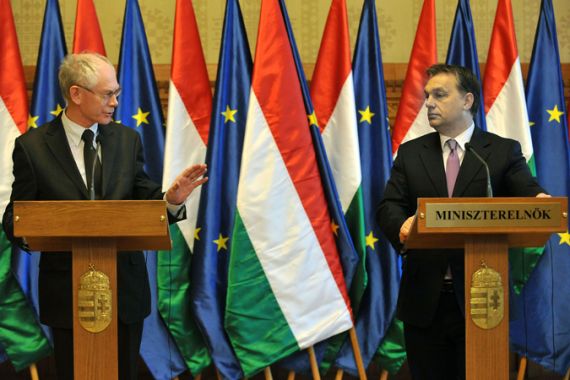Hungary takes EU presidency
Country takes the helm for six months amid euro zone debt crisis and concerns about its suitability for the post.

Hungary has taken the helm of the European Union, even as a controversial new law that has sparked concerns over media freedom in the country comes into force.
The country will have the six-month rotating presidency at a crucial time for the 27-nation bloc. Chief amongst the issues Hungary will have to grapple with are the eurozone debt crisis and negotiations over the EU’s long-term budget.
Alarm bells are ringing in Brussels, however, about Hungary’s domestic political agenda.
Viktor Orban, the Hungarian prime minister, came to power in April, when his centre-right Fidesz party won an unprecedented two-thirds majority in the parliament, giving him the power to change laws and amend the constitution with little opposition.
Critics say he has set about creating a one-party state, with independent institutions either abolished or taken over by his allies.
The latest issue to raise alarm among other EU countries has been the creation of a new watchdog agency to regulate Hungarian media content, with effect from Saturday.
Right to inspect
The new authority will be headed by members of Orban’s Fidesz party, and will have the right to inspect media equipment and documents, and to force journalists to reveal their sources on issues related to national security.
The Organisation for Security and Co-operation in Europe (OSCE) has criticised the law as a danger to press freedom. The European Parliament has also spoken out against the move, as have individual countries, including Germany.
“The newly created media authority will receive an exceptionally wide power and it will be able to control all kinds of media outlets, not only the electronic media like TV and radio stations but also the printed press and the Internet,” Marton Nehez-Posony, a media law expert, told Al Jazeera.
Regardless of domestic concerns, Hungary’s biggest challenge as EU president will be to manage the euro zone debt crisis.
The country will oversee the launch of highly delicate talks about the EU budget from 2014-2020, which looks set to pit rich countries such as Britain, France and Germany against poorer eastern members.
The UK has publicly called for the EU budget to be frozen at current levels, in light of the global financial crisis.
Divisive issue
Another potentially divisive issue will be the possible enlargement of Europe’s “Schengen” visa-free travel zone. Romania and Bulgaria, supported by Hungary, hope to join the area in March 2011, but France and Germany have decided to block their membership bids.
One of the big events of the presidency will be the second Eastern Partnership Summit in Budapest in May.
The goal of the partnership, launched by the EU in 2009, is to develop economic and political relations between the bloc and six former Soviet Republics of Armenia, Azerbaijan, Belarus, Georgia, Moldova and Ukraine.
Hungary also hopes to advance Croatia’s bid to join the EU.
Hungary narrowly escaped bankruptcy in late 2008 thanks to a 20bn euro bailout package from the EU and the International Monetary Fund. In return, the country pledged to reduce its deficit from over 9 per cent of gross domestic product in 2006 to below 3 per cent in 2011.
In order to do so, however, Orban will walk a political and financial tightrope, as he was elected on promises to cut taxes.
So far, he has ordered the nationalisation of Hungary’s private pension funds’ assets, and levied “crisis” taxes on the banking, telecommunications, energy and retail sectors.
The EU and IMF have said these measures are too short-term in nature.